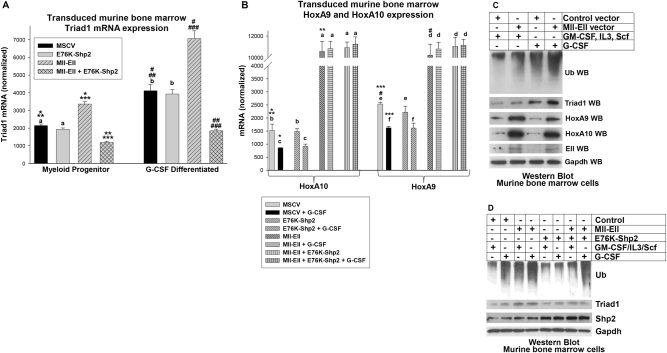Fig. 2.
Mll-Ell increased Triad1 expression in myeloid progenitor cells with or without G-CSF. Murine bone marrow myeloid progenitor cells were transduced with vectors to express Mll-Ell, constitutively active Shp2 (E76K), both or control vector. a Triad1 mRNA was increased in Mll-Ell transduced murine bone marrow myeloid progenitors with and without differentiation, but this was reversed by constitutively active Shp2. Significant differences indicated by *, **, ***, #, ##, or ###. Not significantly different expression indicated by ‘a’ or ‘b’. b HoxA9 and HoxA10 were equivalent in cells expressing Mll-Ell. Significant differences indicated by *, **, ***, or #. Not significantly different expression indicated by ‘a’, ‘b’, ‘c’, ‘d’, ‘e’, or ‘f’. Bars in these graphs are means and error bars ± SEM. c Mll-Ell increased Triad1 protein and total protein ubiquitination in myeloid progenitors with or without granulocyte differentiation. Western blots were serially probed with antibodies to total ubiquitinated (Ub) protein, Triad1, HoxA9, HoxA10, Ell, or Gapdh (loading control). d Shp2 activity decreased Mll-Ell-induced Triad1 expression and protein ubiquitination. Western blots were probed with total Ub protein, Triad1, Shp2, and Gapdh (loading control) antibodies

